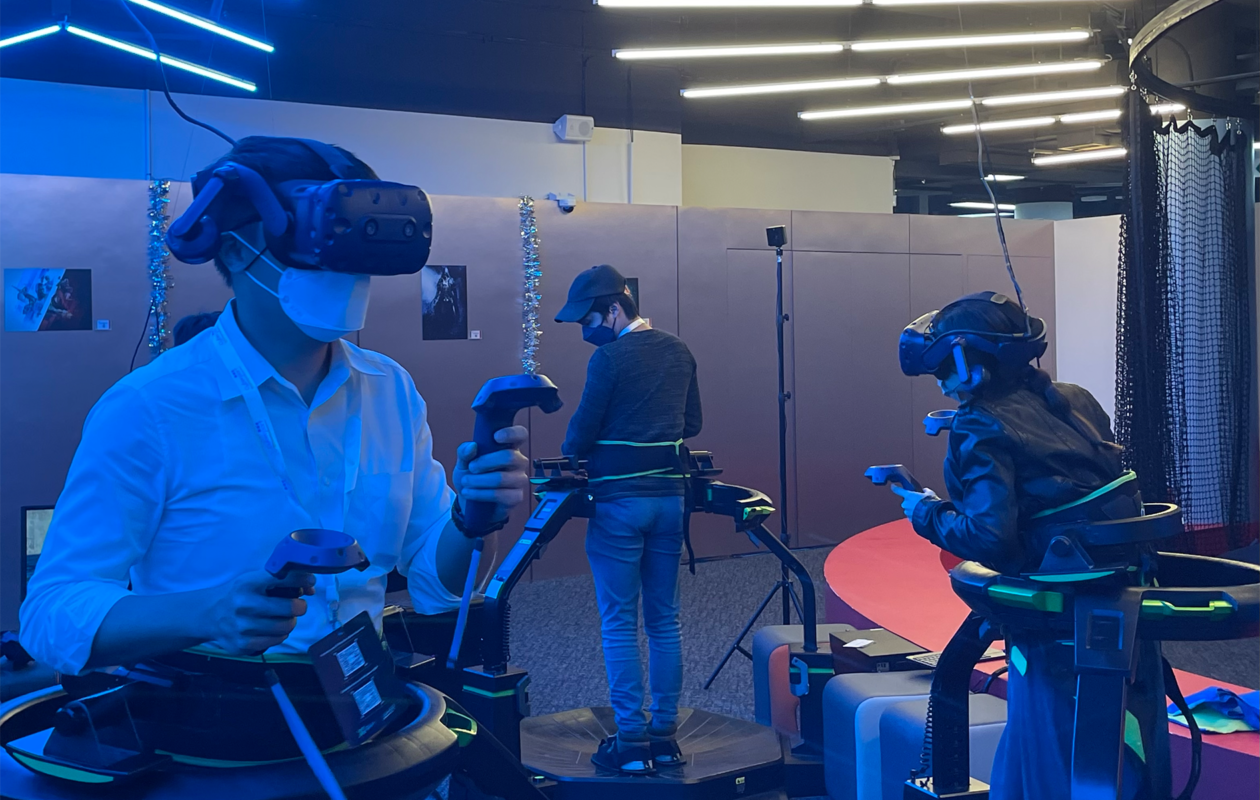With a gripping theme of “Infinity Games,” Hong Kong’s Digital Entertainment Leadership Forum (DELF) was held over the past weekend at Cyberport, a business park and home to a creative digital community. Gamers of all ages gathered for a glimpse of what evolving video games have in store for the future.
In between sessions, visitors freely roamed around the venue and its booths holding immersive and cutting-edge game experiences, including virtual formula e-racing workshops, drone racing championships, and live FIFA and League of Legends’ Wild Rift tournaments.
The forum, held in a hybrid format of online and in-person sessions, gathered more than 70 renown international and local developers and experts, who shared their view on the present and future of digital entertainment. Max Howard, former producer and studio executive for Walt Disney and DreamWorks Animation, discussed the impact on cinemas and the traditional way of distribution brought by the emerging appetite for streaming services witnessed during the worldwide pandemic.
But overall, the forum focused on how video games can evolve in the future. Thus the discourse on blockchain gaming was one of the event’s main highlights. In a session named “Gaming Without Limit: Building a Metaverse for Gamers,” Hendrick Sin, co-founder and vice chairman of Chinese mobile game developer CMGE, said incorporating a blockchain-based metaverse into well-developed intellectual properties (IP) can lead to more than a game experience for users. “You can find friendship, you can build businesses, everything you see, everything you touch can be tradable with NFT (non-fungible token) blockchain technology,” Sin said.
Hong Kong’s leading blockchain game developer and investor Animoca Brand’s group president Evan Auyang followed up the discourse with his session on the future of gaming in the Web 3.0 ecosystem.
“In a regular free-to-play game or console game, the skin that you have and all the upgrades that you have, the money spent in those games, they are not owned by you. But with respect to what we do is that we’re trying to enable true digital asset ownership through the blockchain,” Auyang said. “And what happens is that your engagement level or gamers’ engagement level becomes completely different.”
Auyang added that a true open metaverse is owned by everyone, not by giant companies: “[In blockchain gaming], there’s true ownership because it’s under the blockchain. It is free, composable, therefore is tradable and there’s value.”
In a separate interview with Forkast.News, Auyang insisted that gaming in the open metaverse and Web 3.0 ecosystem grants even further opportunities than just ensuring digital ownership. “Even if you don’t have assets and money to buy, you can do work in the metaverse,” Auyang said. “It’s stuff that you want to do and you’re good at and you’re really valued in there, right? If you find a market for yourself, that really allows you to define who you are.” Auyang says this will change the dynamics of living and working for the new generation that grows up with the open metaverse.
Apart from how blockchain technology enhances the gaming experience in general, Simon Wong, vice-chairman of the Hong Kong Game Industry Association (HKGIA) brought an insider look into blockchain gaming in the regional Hong Kong market.
Wong drew a clear line between blockchain-based games and play-to-earn blockchain games. “Blockchain games and GameFi (game finance) games are actually two completely separate markets,” Wong said. Blockchain-based games provide decentralization and transparency to games similar to traditional or existing video games — it eliminates the central power and gives ownership of in-game achievements to individual players. Whereas in play-to-earn, users participate in the actual video game but also in earning cashable tokens.
Wong says that while play-to-earn games or GameFi is not too big among traditional Hong Kong gamers, many have yet to break the entrance barrier, such as in setting up an e-wallet. However, he believes that elements of play-to-earn can be a good marketing tool in the future for traditional games to increase appeal or retention among users.
Looking ahead in terms of regulations under Hong Kong, Wong believes crypto tokens may fall under stricter governance in the foreseeable future but rules would differ for NFTs used for virtual game items. He says it is unlikely that GameFi would be restricted as it is in South Korea, for tradable virtual items have been around for more than 20 years. “Even if it is banned, our games actually launch for the worldwide community, so it wouldn’t really be affected.”





